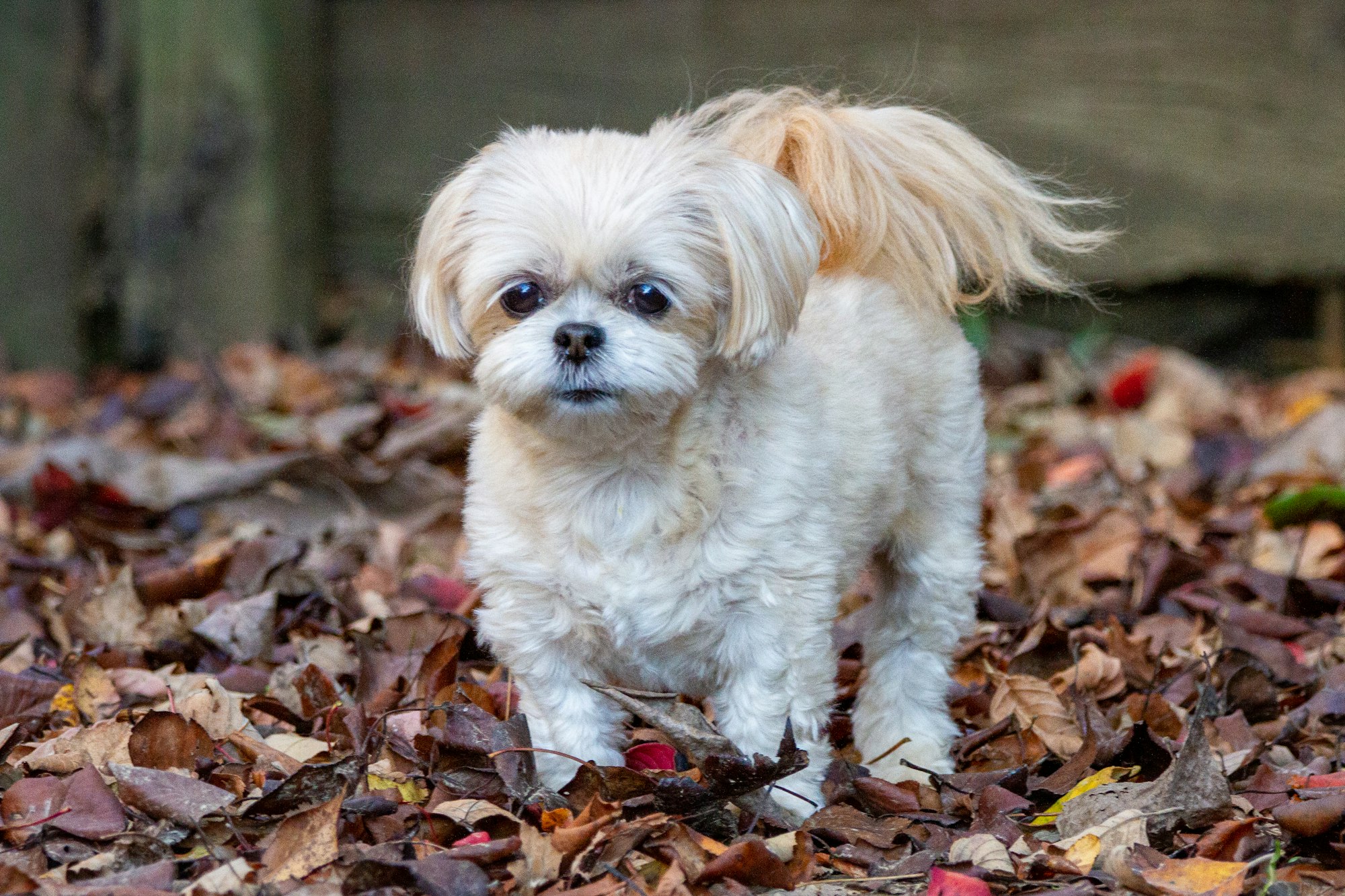Have you ever wondered if your adorable Shih Tzu possesses a remarkable level of intelligence? The debate about the cognitive abilities of different dog breeds has been ongoing, and Shih Tzus are no exception. In this article, we'll explore the intricacies of Shih Tzu intelligence, debunk common myths, and delve into real stories that showcase the brilliance of these charming little dogs..

Shih Tzu Breed Characteristics
Before we assess intelligence, let's understand the basics of the Shih Tzu breed. Known for their distinctive appearance with a flowing double coat and friendly demeanor, Shih Tzus are a small toy breed originating from Tibet. Their endearing personality and affectionate nature make them popular companions.
Understanding Canine Intelligence
Understanding the intelligence of dogs involves recognizing the different dimensions in which it manifests. Canine intelligence is multifaceted, encompassing problem-solving skills, social intelligence, and adaptive learning. In this section, we'll explore the intricacies of canine cognition and how it plays a role in the Shih Tzu's overall intelligence.
Different Types of Canine Intelligence
Canine intelligence can be categorized into several types, including instinctive intelligence, adaptive intelligence, and working intelligence. Instinctive intelligence refers to a dog's ability to perform tasks it was bred for, such as herding or retrieving. Adaptive intelligence involves problem-solving and learning from the environment, while working intelligence pertains to the ability to follow commands.
Measuring Canine Intelligence
Quantifying a dog's intelligence can be challenging, as it goes beyond traditional IQ tests. Various factors, including breed traits, individual characteristics, and the context of the task, contribute to a dog's perceived smartness. Recognizing and appreciating the diversity in canine intelligence is essential for understanding and evaluating Shih Tzu intelligence.
Shih Tzu Intelligence Myths
Shrouded in misconceptions, the intelligence of Shih Tzus often falls victim to stereotypes. In this section, we'll debunk common myths surrounding Shih Tzu intelligence and shed light on the factors that influence the perception of their cognitive abilities.
Common Misconceptions
One prevailing myth is that small dog breeds, like Shih Tzus, are less intelligent than their larger counterparts. Size, however, is not a reliable indicator of intelligence. Shih Tzus may be diminutive, but their cognitive abilities can rival those of larger breeds.
Factors Influencing Perceived Intelligence
External factors, such as a Shih Tzu's behavior and response to training, contribute significantly to how intelligent they are perceived to be. Additionally, individual differences among Shih Tzus and their unique personalities can influence how their intelligence is interpreted by owners and observers.
Evidence of Shih Tzu Intelligence
While debunking myths is crucial, providing tangible evidence of Shih Tzu intelligence is equally important. In this section, we'll explore real-life examples and anecdotes from Shih Tzu owners that showcase the breed's cleverness and ability to learn.
Anecdotes from Shih Tzu Owners
Owners often share stories of their Shih Tzus displaying remarkable problem-solving skills and emotional intelligence. These anecdotes serve as firsthand accounts of the breed's capacity for learning and adapting to various situations.
Noteworthy Achievements in Training
Beyond anecdotes, there are documented cases of Shih Tzus excelling in training programs and competitions. Whether it's obedience training, agility, or tricks, Shih Tzus have demonstrated a high level of trainability, proving that their intelligence extends beyond mere charm.
Factors Affecting Shih Tzu Intelligence
Understanding the intelligence of Shih Tzus involves examining various factors that contribute to their cognitive abilities. In this section, we'll delve into the elements that shape the intelligence of Shih Tzus and influence their behavior and learning capabilities.
Genetics and Breeding
- Breed Traits: Shih Tzus, like all dog breeds, have specific traits ingrained in their genetics. These traits influence their predisposition to certain behaviors and levels of intelligence.
- Lineage: The breeding history of a Shih Tzu can play a role in its intelligence. Responsible breeding practices that prioritize health and temperament contribute to a more well-rounded and intelligent breed.
Environmental Factors
- Early Socialization: The environment in which a Shih Tzu is raised significantly impacts its socialization skills. Early exposure to various stimuli, people, and environments contributes to a more adaptable and socially intelligent Shih Tzu.
- Living Conditions: A stimulating and enriching living environment fosters cognitive development. Shih Tzus thrive in environments that provide mental challenges, such as interactive dog toys and varied experiences.
Training and Socialization
- Positive Reinforcement: The method and consistency of training directly influence a Shih Tzu's ability to learn and showcase intelligence. Positive reinforcement techniques, such as treats and praise, are particularly effective.
- Regular Interaction: Regular interaction with both humans and other dogs enhances a Shih Tzu's social intelligence. This positive exposure contributes to their ability to understand and respond to various social cues.
Nutrition and Health
- Balanced Diet: Proper nutrition is essential for overall health, including cognitive function. A well-balanced diet ensures that a Shih Tzu receives the necessary nutrients for optimal brain development.
- Health Issues: Certain health issues can impact a Shih Tzu's cognitive abilities. Regular veterinary check-ups and addressing health concerns promptly contribute to maintaining their overall intelligence.
Understanding and considering these factors can aid Shih Tzu owners in creating an environment that promotes cognitive development and nurtures the intelligence of these charming companions.

Comparative Intelligence among Dog Breeds
Understanding the intelligence of Shih Tzus becomes even more enlightening when placed in the context of other dog breeds. In this section, we'll explore how Shih Tzus fare in comparison to different breeds and highlight their unique strengths in the spectrum of canine intelligence.
Shih Tzu in the Context of Other Breeds
While intelligence varies widely among dog breeds, each breed possesses its own set of cognitive strengths. Shih Tzus, with their affectionate nature and adaptability, may not excel in all areas but showcase distinctive qualities that contribute to their overall intelligence.
Breed-Specific Strengths
Every dog breed has traits that make them unique, and these traits often align with their original purposes. Shih Tzus, originally bred as companions for Chinese royalty, bring a combination of social intelligence and adaptability to the table. Understanding these strengths is crucial for appreciating the intelligence of Shih Tzus within the broader spectrum of canine breeds.
Training Shih Tzus for Success
Effective training is key to unlocking the full potential of a Shih Tzu's intelligence. In this section, we'll delve into practical tips for successful training and building a strong, communicative bond with your Shih Tzu.
Tips for Effective Training
- Patience is Key: Shih Tzus respond well to positive reinforcement, but it takes time. Be patient and consistent in your training approach.
- Use Small Treats: Given their size, Shih Tzus appreciate smaller treats as rewards during training sessions. This keeps them motivated without overindulging.
- Short, Engaging Sessions: Keep training sessions short and engaging to maintain your Shih Tzu's interest. Frequent, brief sessions often yield better results than lengthy ones.
Building a Strong Bond
Training goes beyond commands; it's an opportunity to strengthen the bond between you and your Shih Tzu. Incorporate playtime, positive interactions, and moments of affection into your training routine to foster a trusting relationship.
Challenges in Shih Tzu Training
Training a Shih Tzu can be a rewarding experience, but it comes with its own set of challenges. Understanding and addressing these challenges is crucial for successful and effective training sessions.
1. Stubbornness:
- Challenge: Shih Tzus are known for their independent streak, which can translate into stubborn behavior during training.
- Strategy: Consistency and positive reinforcement work well. Patience is key when dealing with their independent nature, and using rewards for desired behaviors encourages cooperation.
2. Distractibility:
- Challenge: Shih Tzus can be easily distracted, especially in new environments or with novel stimuli.
- Strategy: Gradual exposure to distractions during training helps build focus over time. Start in a controlled environment and gradually introduce new elements to prevent overwhelming your Shih Tzu.
3. Short Attention Span:
- Challenge: Shih Tzus, like many small breeds, may have a shorter attention span.
- Strategy: Keep training sessions short and engaging. Multiple short sessions are often more effective than one long session, helping maintain their interest and focus.
4. Sensitivity:
- Challenge: Shih Tzus can be sensitive to the tone of voice and body language during training.
- Strategy: Use a gentle and positive tone. Avoid harsh corrections, as they may become disheartened. Positive reinforcement, such as treats and praise, enhances their responsiveness.
5. Adaptation to Routine:
- Challenge: Shih Tzus can become bored with repetitive routines, affecting their enthusiasm for training.
- Strategy: Keep training sessions varied and incorporate different activities. Introduce new commands or tricks to keep their minds engaged and prevent monotony.
6. Housebreaking Challenges:
- Challenge: Shih Tzus may present challenges in housebreaking due to their small size.
- Strategy: Establish a consistent routine for bathroom breaks. Positive reinforcement for outdoor elimination and patience during the process contribute to successful housebreaking.
7. Selective Listening:
- Challenge: Shih Tzus may exhibit selective listening, especially if they find a task uninteresting.
- Strategy: Make training enjoyable by incorporating games and activities. Vary the rewards and keep them motivated by integrating play into the training routine.
Understanding these challenges and employing positive, patient, and consistent training techniques can help Shih Tzu owners overcome obstacles and create a strong, cooperative bond with their intelligent and spirited companions.
Interactive Games for Shih Tzus
Keeping your Shih Tzu mentally stimulated is crucial for their overall well-being. In this section, we'll explore interactive games that not only entertain but also engage your Shih Tzu's cognitive abilities.
Games to Stimulate Intelligence
- Puzzle Toys: Invest in puzzle toys that dispense treats when manipulated. This not only entertains your Shih Tzu but also encourages problem-solving skills.
- Hide and Seek: Hide treats or favorite toys around the house and encourage your Shih Tzu to find them. This game taps into their natural scavenging instincts, providing mental stimulation.
- Fetch with a Twist: Instead of a traditional game of fetch, use toys that require a bit of manipulation before tossing. This adds an extra layer of mental engagement to a classic game.
Benefits of Mental Stimulation
Interactive games serve more than just entertainment; they contribute to your Shih Tzu's cognitive development. Regular mental stimulation can prevent boredom-related behavioral issues and strengthen the bond between you and your furry friend.
Real Stories of Shih Tzu Intelligence
Beyond theories and generalizations, real stories from Shih Tzu owners offer a glimpse into the extraordinary intelligence of this breed.
Heartwarming Tales from Shih Tzu Owners
- Problem-Solving Prowess: Owners share instances where their Shih Tzus showcased remarkable problem-solving skills, from figuring out how to access treats to finding inventive ways to communicate.
- Emotional Understanding: Numerous stories highlight the emotional intelligence of Shih Tzus, such as sensing their owner's mood and providing comfort during challenging times.
Extraordinary Feats and Behaviors
From learning complex tricks to adapting to new environments, Shih Tzus consistently surprise their owners with extraordinary feats. These real stories underscore the depth of intelligence that Shih Tzus bring to the table.
Shih Tzus as Therapy Dogs
The intelligence and gentle nature of Shih Tzus make them well-suited for therapeutic roles. In this section, we'll explore their capacity to serve as therapy dogs and the emotional intelligence they bring to such settings.
The Role of Shih Tzus in Therapy
- Comfort and Companionship: Shih Tzus excels in providing comfort and companionship, making them ideal therapy dogs for individuals facing emotional or physical challenges.
- Adaptability in Different Environments: Shih Tzus' adaptability shines in therapy work, as they easily navigates various environments, bringing joy and emotional support to those in need.
Emotional Intelligence in Therapy Work
Shih Tzus, with their innate empathy and understanding, can often sense the needs of individuals during therapy sessions. Their calming presence and affectionate nature contribute to the success of therapy interventions.
Conclusion
In conclusion, the intelligence of Shih Tzus is a fascinating subject that goes beyond stereotypes. While their small stature might lead to misconceptions, Shih Tzus consistently prove themselves to be intelligent and trainable companions. By understanding their unique characteristics and providing proper training, you can unlock the full potential of your Shih Tzu's cognitive abilities.

FAQs about Shih Tzu Intelligence
Here are a few questions about Shih Tzu intelligence.
- Q1. Are Shih Tzus considered intelligent dogs?
- Shih Tzus are indeed intelligent dogs. While they may not excel in all areas of canine intelligence, their adaptability, problem-solving skills, and emotional intelligence contribute to their overall smartness.
- Q2. Do Shih Tzus require special training techniques due to their size?
- While their small size should be considered, Shih Tzus respond well to positive reinforcement training methods. Consistency, patience, and using appropriately sized treats are essential for effective training.
- Q3. Can Shih Tzus learn tricks easily?
- Yes, Shih Tzus are generally quick learners and can excel at learning a variety of tricks. Their eagerness to please and sociable nature make them enjoyable to train.
- Q4. Are Shih Tzus easy to train?
- Shih Tzus can be trained effectively with patience and positive reinforcement. Their intelligence, coupled with a gentle approach, makes them responsive to training sessions.
- Q5. Do Shih Tzus get along well with children?
- Generally, Shih Tzus are known for their gentle and friendly nature, making them suitable for families with children. However, as with any happy dog, proper socialization is essential for a positive relationship.
These frequently asked questions provide insights into the intelligence, training, and compatibility of Shih Tzus, helping potential owners understand what to expect when bringing this delightful breed into their homes.